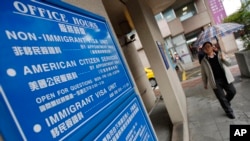Taiwan should expect one or two senior visitors this month and an open door in the years ahead following the U.S. government’s decision Saturday to lift its ban on high-level contacts, a rule it had observed to get along with the Asian island’s political rival China, scholars believe.
U.S. Secretary of State Michael Pompeo declared Saturday that previous restrictions on Taiwan-bound travel by American diplomats, service members and other officials were “null and void.” He said the U.S. government had been living by the self-imposed rules in an “attempt to appease the Communist regime in Beijing.”
Trump’s administration has warmed toward Taiwan diplomatically and militarily since 2017 as the U.S. clashes with old Cold War foe China over trade, technology sharing and consular issues. China claims self-ruled Taiwan as part of its territory and gets angry when the United States supports Taipei.
The U.S. government that has catapulted relations with Taipei to their strongest since the 1970s – part of a joint resistance against China – already confirmed last week it would send its U.N. Ambassador Kelly Craft to Taiwan January 13-15. Taiwan, despite years of protests, cannot join the United Nations nor its agencies, such as the World Health Organization, as Chinese allies block most bids for Taiwanese participation.
While some analysts suggested Pompeo himself could reach Taiwan before Trump’s scheduled departure from the White House January 20, the State Department ruled it out Sunday, saying Pompeo’s upcoming trip to Europe will be his last.
Kwei-bo Huang, vice dean of the international affairs college at National Chengchi University in Taipei, said the Trump administration clearly appears to be taking jabs at China on its way out.
“That seems to be what the Chinese are targeting the most,” said Yun Sun, East Asia Program senior associate at the Stimson Center research group in Washington. “They just want Trump to go away quickly and quietly without getting into any trouble.”
“That seems to be what the Chinese are targeting the most,” said Yun Sun, East Asia Program senior associate at the Stimson Center research group in Washington. “They just want Trump to go away quickly and quietly without getting into any trouble.”
China stepped up military flights into Taiwan’s air defense identification zone after U.S. health secretary Alex Azar traveled to Taiwan in August and state department undersecretary Keith Krach arrived a month later.
Trump himself could technically visit Taiwan but would gain little from a trip as mounting transfer-of-power issues swirl in Washington, Sun said.
U.S. officials began liberalizing high-level contact with Taiwan in 2018 when Congress passed the Taiwan Travel Act, which says U.S. policy should let officials visit Taiwan “to meet their Taiwanese counterparts”.
The Communist leadership in Beijing has called Taiwan its own since the Chinese civil war of the 1940s, when Chiang Kai-shek’s Nationalists lost to Mao Zedong’s forces and rebased on the nearby island. Most Taiwanese said in government surveys two years ago they oppose unification with modern China.
Taiwan President Tsai Ing-wen supports that sentiment and seeks closer U.S. ties as a counterweight. The United States cut ties with Taiwan in 1979 in favor of the fast-growing China but retains a strong informal relationship with the island.
China-Taiwan ties deteriorated last year as Taiwan-U.S. relations improved. Chinese military aircraft increased flights near the island in mid-2020 and the two sides lack a mechanism to hold formal talks.
The Taiwan government welcomed Pompeo’s statement Sunday and Foreign Minister Joseph Wu tweeted that the curbs on high-level visits were “unnecessarily limiting our engagements these past years.”
President-elect Joe Biden is widely expected to engage China more fervently than Trump. He will support “a peaceful resolution” of China-Taiwan issues, Taiwan government-funded Central News Agency reported Sunday, citing a member of Biden's transition team.
Pompeo’s order Saturday on lifting travel rules seeks to make Taiwan policy direction “irreversible”, Sun said. Biden can leverage Pompeo’s edict to reach out to Taiwan as needed without excessive anger from China, said Derek Grossman, senior analyst with the U.S.-based Rand Corp. research institution.
“I think when a soon-to-be past administration makes a decision, then the new administration doesn’t have to worry as much about that, because it’s already been done,” Grossman said.






